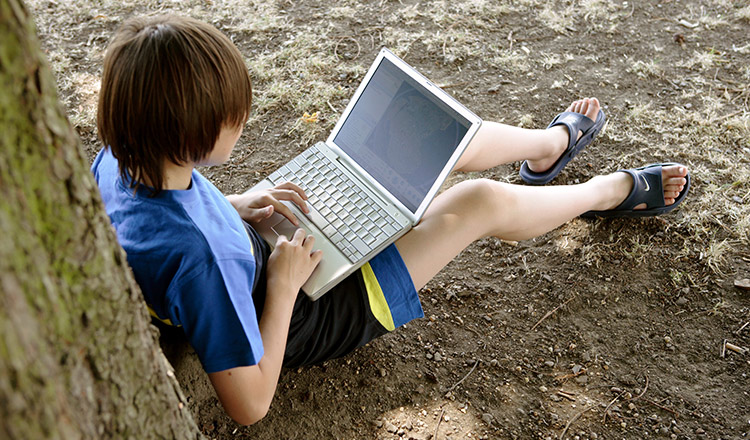We all know that kids look to parents for modelling behavior, but how many of us really consider the effect our own screen time behavior shapes our kid’s future usage – and health? According to a new survey, Cyber Safety – Balancing Screen Time Survey, which asked 1348 Australian parents of children aged 3-17 years about their own use and their children’s use of devices, parents are a key influencer on their children’s online behavior. And alarmingly, 65 per cent of parents surveyed do not think they’re good role models.
So where’s a good place to start good digi behaviour? “Balancing screen time and being a good role model to children is knowing how to balance time online with all your lifestyle activities,” advises Telstra’s Cyber Safety Manager, Shelly Gorr. “That means getting enough sleep, getting enough exercise, going to work and having face to face time with people. For parents, it’s about bringing that awareness to your home and role modeling the kind of behavior you’d like to see in your children. Set rules that are important to you and your family then use positive behavior to model them.”
Here, Shelly shares her top strategies for being a great cyber role model…
1. Disconnect When The Lights Go Out
Who’s guilty of taking their mobile to bed with them? A lot, according the Cyber Safety findings, with 62 per cent of parents using their device between 9pm and midnight, and 17 per cent falling asleep while using their devices. “We recommend switching off your devices an hour before bedtime,” explains Shelly. “The shortwave blue light emitted from devices keeps you awake and interferes with your melatonin. Sleep time is when your body and mind is in shutting down mode – it needs to unwind and relax. If your mind is fluttering from reading posts of social media or replying to texts and you’re thinking about things or you’ve been on your devices for a while, it might take longer to fall asleep.
Sleep is key to alertness, concentration, memory, having a healthy weight and mental health.” But this behaviour is rife, with the survey showing a massive 74 per cent of children aged 12-17 use their device between 9pm and midnight on school nights, with 39 per cent falling asleep while using their device. “Practice good sleep hygiene and keep the bedroom a device free-zone, so that you’re not tempted to keep texting after you’ve turned off the light,” suggests Shelly.
2. Don’t Multitask Your Screen time
We may think we’re being super-efficient parents getting our social media goss update while watching the news or chatting on messenger, but multi-tasking for young developing brains is not beneficial, so avoid doing it in front of them. “It’s absolutely fine to second-screen if you’re relaxing,” says Shelly. “For example, if you are watching TV and you need to send a text to a friend. The issue is that parents often don’t consider how this behavior may influence their children’s school lives and academic performance.
Having two screens at the same time is really attributing to multitasking, and we know that multitasking with digital devices isn’t going to get the best out of your concentration. You’re going to get distracted quite easily, and this is not an efficient way to be using your time. If children have a cognitive task to focus on, such as homework, then it’s really best to put the device away and to have an hour or two of undivided attention. They can then take that break and check their phone, texts or have a browse.”
3. Unplug During Meal Times
OK every family is different, and you might be totally fine with phone calls or the iPad. But if dinners are important for conversing with your child and spending quality time together, unplug. “If it’s important to you that mealtimes are device-free, make sure you put your mobile away during dinner because children are happier if everyone in the family follows the rules,” suggests Shelly.
4. Balance Digital Time With… Life
Teaching kids to have a fully enriching and satisfying life is a no-brainer, but you need to show them that there’s life beyond the digital device. “You can certainly model that yourself through positive behaviour,” explains Shelly. “They need to talk to people face to face, do their homework, get their sleep, exercise – it’s all part of a healthy balanced life.”
For more information about staying safe and enjoying the online world, visit Telstra’s Cyber Safety page. Telstra’s Cyber Safety page.









